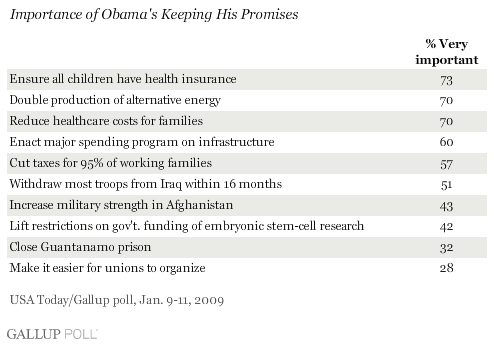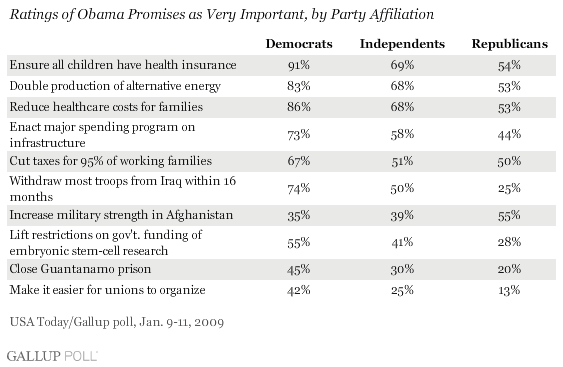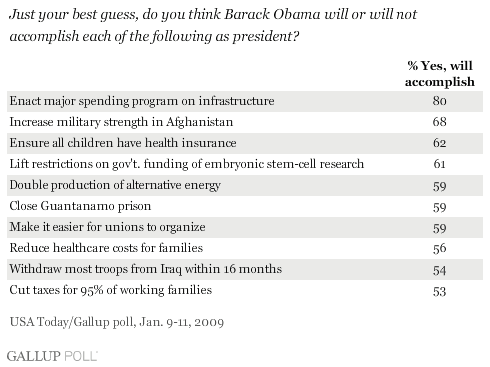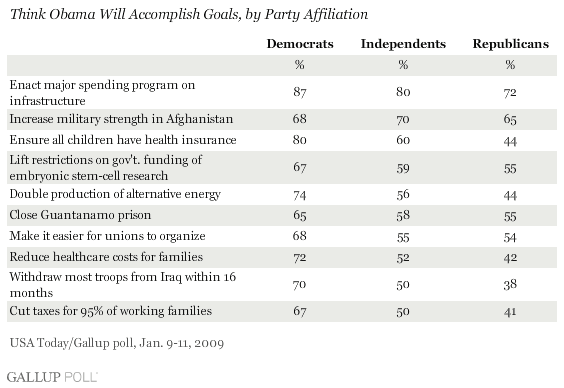PRINCETON, NJ -- Americans think it is very important that Barack Obama follow through on his promises to address problems in healthcare, energy, and the economy. They are less likely to view his pledges to withdraw U.S. troops from Iraq or expand U.S. military power in Afghanistan as critical priorities.

At least 7 in 10 say it is very important for Obama to follow through on his pledges to ensure all children have health insurance coverage, double the production of alternative energy, and reduce healthcare costs for the typical family by up to $2,500 per year.
Two major planks of his economic stimulus program -- a major spending program on the nation's infrastructure to help create jobs, and cutting income taxes -- are viewed as very important promises by roughly 6 in 10 Americans.
But only a slim majority of 51% say it is very important that Obama withdraw most U.S. combat troops from Iraq within 16 months, one of his most prominent campaign promises. And fewer, 43%, assign a high degree of importance to his pledge to increase U.S. military strength in Afghanistan.
There are three promises -- two domestic and one international -- that are lower priorities for Americans: lifting restrictions on government funding of embryonic stem-cell research (42%), closing the Guantanamo Bay prison for terrorist suspects (32%), and making it easier for labor unions to organize (28%). News reports suggest that Obama may in fact follow through with the first two of these and issue executive orders concerning them within the first several days of his administration.
For nearly every one of these potential actions, Democrats are more likely than Republicans to identify them as very important to do. The sole exception comes in regard to increasing U.S. military strength in Afghanistan, which ranks at the top of the Republican priority list (with 55% saying it is very important for Obama to do) but at the bottom of Democratic list.

What Will Obama Be Able to Accomplish?
A separate question in the poll asked Americans, for each of the items, whether they think Obama will accomplish it as president. At least a majority of Americans say he will accomplish each one, ranging from a low of 53% for cutting income taxes for American families to a high of 80% for enacting a major spending program on infrastructure.

No fewer than 65% of Democrats think Obama will be able to accomplish each of the goals. Republicans are more skeptical, however, with at least a majority thinking he can accomplish only 5 of the 10 goals tested in the survey. Republicans are least confident he can withdraw most U.S. troops from Iraq in the near future.

Economy Dominant as Most Important Problem
The economy remains the runaway leader when Americans are asked to name the most important problem facing the country. Nearly 8 in 10 Americans mentions some economic concern, with the most common being general mentions of the economy (57%). But unemployment (11%) and a lack of money (8%) are also significant concerns.
The Iraq war is the top non-economic problem, mentioned by 13% of respondents, followed by dissatisfaction with government (5%), healthcare (4%), moral and ethical decline (3%), and national security (3%).
Survey Methods
Results are based on telephone interviews with 1,009 national adults, aged 18 and older, conducted Jan. 9-11, 2009. For results based on the total sample of national adults, one can say with 95% confidence that the maximum margin of sampling error is ±3 percentage points.
Interviews are conducted with respondents on land-line telephones (for respondents with a land-line telephone) and cellular phones (for respondents who are cell-phone only).
In addition to sampling error, question wording and practical difficulties in conducting surveys can introduce error or bias into the findings of public opinion polls.
